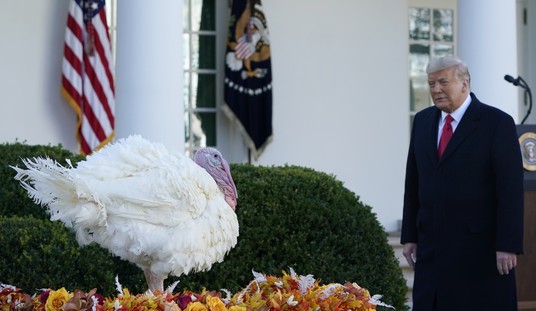Tuesday marks the 1,350th day since the Senate passed a budget. The law requires Congress to pass a budget every year, on the grounds that Americans deserve to know how the government plans to spend the trillions of taxpayer dollars it collects, along with dollars it borrows at the taxpayers’ expense. But Majority Leader Harry Reid, who last allowed a budget through the Senate in April 2009, has ignored the law since then…
“I think it should be a firm principle that we should not raise the debt ceiling until we have a plan on how the new borrowed money will be spent,” Sessions told me Monday in a phone conversation from his home in Alabama. “If the government wants to borrow money so it can spend more, then the government ought to tell the Congress and the American people how they will spend it.”…
As Sessions sees it, Reid’s budget gambit is the result of a long-term plan. “It’s not a failure of leadership,” Sessions said. “This is part of the president’s political tactics. There’s no doubt in my mind that the White House and the Senate leadership calculated that the lumps they would take for not producing a budget were preferable to actually exposing their financial plan for the future.”
The debt ceiling ought to be raised because nobody has a plan to eliminate the deficit immediately, and there is no popular support for doing what that would take. A congressman who isn’t presenting and supporting a zero-deficit-now plan has an obligation to give the federal government the additional borrowing authority that continued deficits make necessary.
For liberals, that’s the end of the matter. The debt ceiling should be raised without any spending cuts attached, and ideally it should be raised to infinity. One common argument goes like this: Since Congress sets spending and tax levels, no good purpose is served by holding a separate vote making it possible for the government to follow Congress’s original instructions.
That argument would have more force if the federal budget were the result of a deliberate policy. Instead, more and more of our spending rises on autopilot because of decisions made long ago, and nobody is forced to take responsibility for the gap between revenue and commitments. Bills to raise the debt ceiling are the only occasions when congressmen and the president come close to doing so. They are thus appropriate moments to attack the trends that are driving our rising debt.
The trillion dollar platinum is an absurdity wrapped in a legislative incongruity inside a farce. It is the logical extension of an utterly illogical legislative process that only becomes more irrational with each passing day. Each partisan battle has become stupider than the last. Silly loopholes are exploited for bargaining power, and the resulting stalemates are generally solved with a temporary patch that solves the immediate problem by creating a bigger one down the road. When the bigger problem arrives, naturally the other side seeks an even sillier loophole, resulting in an even more temporary patch…
Consider the fiscal cliff deal that we just passed. Virtually every economist agreed on what needed to happen: Congress should extend all the tax cuts and spending hikes temporarily, because any fiscal tightening would also reduce economic growth and raise unemployment. But because our current trillion dollar deficits are entirely unsustainable, Congress should also set a deadline to have all or most of these temporary measures expire. My favorite proposal would have pegged the expiration to the unemployment rate.
In a month-long round of backroom bargaining interspersed with public name calling, our politicians essentially managed to craft the opposite of this deal. We raised taxes immediately, which will put pressure on a still-weak economy. On the other hand, we also made the overwhelming majority of the Bush tax cuts permanent, at a cost of trillions over the next ten years. Just as Baby Boomer retirements put unprecedented pressure on the Federal budget, we have decided to fix tax revenues at the low end of their historical average…
Try this exercise: name some of President Obama’s campaign pledges. Unless you were actually covering the elecetion, I bet you can only name one: the pledge to raise taxes on people who made more than $250,000. No new programs to solve some problem, no high-concept bargain to unite the nation . . . no, the one thing that Democrats wanted to do was raise taxes for 2% of taxpayers, and only 2% of taxpayers. Not to pay for anything in particular, but just because the rich had too much. And why was this—rather than some actual policy program—the centerpiece of his agenda? Because his base liked it, and because opposing it made the ultra-rich Mitt Romney look like a selfish heel.
[I]f liberals can’t win, conservatives can’t win, and the two sides can’t strike a deal, how are we actually going to get our fiscal house in order?
I think one all-too-plausible answer is that we aren’t. That might mean a genuine debt crisis, a near-default scenario that forces a combination of spending cuts and tax increases, perhaps with some swift inflation worked in, that’s uglier than any grand bargain either side would countenance. But given the resilience of global confidence in the United States over the last two years, it might just mean living with structural deficits that drag on growth for years and decades to come. Indeed, if I were rank-ordering scenarios for the American future right now, the latter possibility would probably rank highest: Neither a massive crisis nor a sweeping legislative solution, but an ugly equilibrium in which muddling-through politicians win enough small victories and reach enough small deals to gradually stabilize the debt-to-GDP ratio … but at a level that all-but-ensures a generation or more of economic stagnation and lurching, shortsighted, crisis-driven domestic policymaking…
In this landscape, no matter which painful solution polls better in the abstract, a political coalition that’s actually laid the groundwork for what it wants to do seems more likely to succeed in doing it. The Republican Party is an unserious party in many ways, but it has leaders (from Paul Ryan to Tom Coburn) who understand that crucial point, and who have spent the last few years elaborating the kind of entitlement reforms that the conservative vision of government requires, and putting their fellow Republicans on the record in support of them. From Barack Obama on down, I don’t see the same thing happening on the Democratic side; instead, I see a party that’s still loath to acknowledge that its program requires sacrifice from anyone save the wealthy, and that just responded to a moment of maximum leverage by narrowing its definition of who constitutes the rich. If Democrats want to raise middle class taxes — and I mean really raise them, not just cut deals that nudge revenue upward a little here and there — they need to lay the political and policy groundwork for that kind of push, and they need to start relatively soon. Until that starts to happen, it seems reasonable to give conservatism slightly better odds than liberalism of winning the long-term fiscal war outright … with the aforementioned structural-deficit stalemate, unfortunately, remaining the most likely outcome of all.
The choice the country faces is simple. We can have big government and the Life of Julia (at least for a while, but that is another essay), with everyone paying through the nose and the middle-class share of taxes rising not falling, or we can return to the American tradition of limited government, with everyone paying a smaller burden to the state, with relatively limited services for, and relatively light taxes on, the middle class. What we cannot have is the Life of Julia at no additional burden to 99 out of 100 of us. Nobody, Left or Right, really thinks that math works, no matter what they may say in public.
So what happens if we continue down the current path, with perhaps some small amount of revenue raised from some additional taxes on the rich? Remember, the only way to finance a big European-style state is to have it paid for by massive taxation of everyone, mostly the middle class. Right now we are avoiding honest debate on this fact, perhaps because those desirous of this change know the middle class would rebel if it saw the future bill it will have to pay. Instead, large government benefits are being continued and increased, and still new ones introduced, with little accurate discussion of who will ultimately pay…
The way to boil the frog of freedom is slowly.
We may, with open eyes, choose the reassuring security of big government with a far larger safety and subsidy net and far higher taxes for all — by no means just the “rich” but in fact more so on the middle class — and likely the sclerotic growth and dependency of Europe. Or we may choose the opposite. But we deserve an honest debate about this critical issue. A debate missing from the last election.
Optimist though I am, I can’t help feeling there’s something to this downhearted consensus. After living through the most peaceful and prosperous half century that any nation has ever experienced in the history of humankind, it seems impossible to believe we would re-elect a mediocre reactionary out to “fundamentally transform” our success into failure. But we did, and that’s — well, let’s call it “less than cheering.”…
So in the interest of letting a little light into the room, and with a full realization that our president is doing a bad job, the congress incapable of stopping him, and the media protecting him with coverups and lies, let me list three positive trends that might transform our country for the better in the next two years…
3. Reality is on our side. When I call Obama a reactionary, what I mean is that he adheres to a grievance-based socialist ideology he learned in college from professors who were probably old even then. As these academics die and go to hell for all eternity, up-and-comers may begin to notice that the poor suffer under left-wing programs and rise under the free market, that education improves under conservative guidance and gets worse under liberals, and that big business actually gets more entrenched and powerful under the left while the right helps the little guy thrive. That, after all, will be the off-beat, radical position, and academics love to be off-beat and radical as long as everyone around them is being off-beat and radical too. A new generation is already on the rise that understands entitlements are unsustainable and that freedom works. It won’t be long at all before we begin to hear their voices in the mainstream. I hope.
Via the Daily Caller.








Join the conversation as a VIP Member